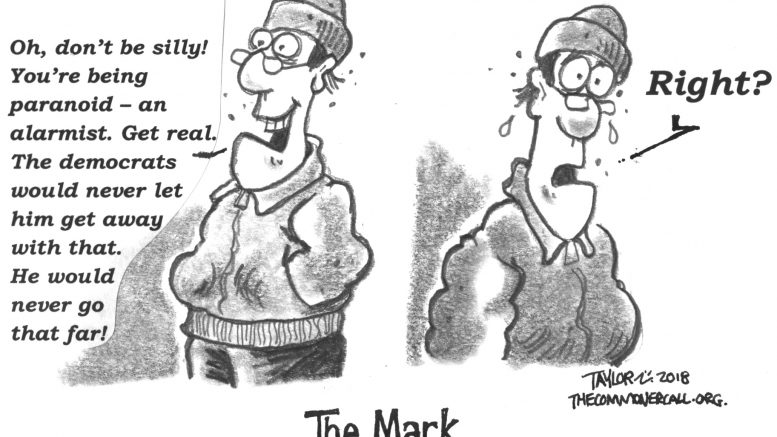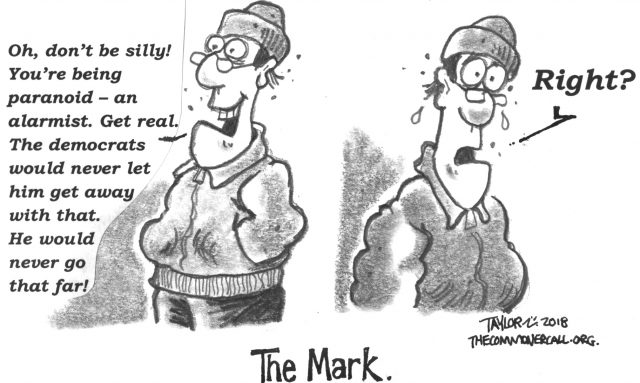While most of these statutory powers have never been used, we now have a President who clearly feels unconstrained by the rule of law.
By Daily Kos (12/8/18)
If the last two years have taught us one thing, it is to take nothing for granted, particularly regarding the stability and resilience of our Republic. We are now witnessing firsthand in Wisconsin and Michigan how one of our two major political parties has become wholly captive to corporate dominance, and how it will behave when its power is taken away by ordinary voters. Instead of accepting the verdict of the people, it will subvert and alter existing law in order to retain power. It will do this in the face of and in spite of widespread, loud public opposition, aided by its own overriding imperative to exert control at all costs.
As John Nichols put it this week in The Nation, the Republican Party is no longer a political “party” per se, but a mere vehicle, a conspiracy for seizing and holding poweron behalf of a tiny sliver of the wealthiest among us. If that wasn’t evident from the grotesquely skewed tax cut inflicted on the American population in 2016—the sole “achievement” of the Republicans’ entire tenure in this Congress—then the assaults on Democracy underway in Wisconsin, Michigan and North Carolina prove it beyond any doubt, as gerrymandered Republican legislators working in the dark hours of the night hastily rewrite the powers afforded to their newly-elected Democratic state governors. An insolent autocracy heedless to the interests or well-being of the American people is no longer “creeping” into government from the shadows. Let’s be clear: it is upon us.
Unknown to most Americans, a parallel legal regime allows the president to sidestep many of the constraints that normally apply. The moment the president declares a “national emergency”—a decision that is entirely within his discretion—more than 100 special provisions become available to him.
This prevailing sentiment among Republicans that they can act to subvert our country’s institutions without any fear of consequence has its apotheosis in the persona of Donald Trump. There has never before been an occupant of the Oval Office so utterly contemptuous of our Constitutional norms, or even the concept of representative government. No other President has displayed such wanton admiration for murderous dictators accountable to no one but themselves. And now, finding himself under threat by the very operation of those laws he despises, there is little if any reason to expect him to behave any less haughtily, and nothing to keep him from grasping for any tool in the Executive’s formidable arsenal to maintain his hold on power.
Elizabeth Goitein co-directs the Brennan Center for Justice’s Liberty and National Security Program. Writing for The Atlantic, she reminds how Trump’s anti-democratic rhetoric reached its fever pitch in the weeks leading up to the November midterm elections:
“Most of his weapons were rhetorical, featuring a mix of lies and false inducements—claims that every congressional Democrat had signed on to an “open borders” bill (none had), that liberals were fomenting violent “mobs” (they weren’t), that a 10 percent tax cut for the middle class would somehow pass while Congress was out of session (it didn’t). But a few involved the aggressive use—and threatened misuse—of presidential authority: He sent thousands of active-duty soldiers to the southern border to terrorize a distant caravan of desperate Central American migrants, announced plans to end the constitutional guarantee of birthright citizenship by executive order, and tweeted that law enforcement had been “strongly notified” to be on the lookout for “ILLEGAL VOTING.””
Without becoming unduly alarmist, Goitein soberly lays out exactly what Trump could do with the Presidential powers he has been entrusted with, should he feel threatened by the prospect of impeachment, for example, preceding the election in 2020. The powers he could exert are reserved to him in the context of declaring a “National Emergency.” And they are considerable. …
- The Atlantic: What The President Could Do If He Declares A State Of Emergency — From seizing control of the internet to declaring martial law, President Trump may legally do all kinds of extraordinary things. …In the weeks leading up to the 2018 midterm elections, President Donald Trump reached deep into his arsenal to try to deliver votes to Republicans. Most of his weapons were rhetorical, featuring a mix of lies and false inducements—claims that every congressional Democrat had signed on to an “open borders” bill (none had), that liberals were fomenting violent “mobs” (they weren’t), that a 10 percent tax cut for the middle class would somehow pass while Congress was out of session (it didn’t). But a few involved the aggressive use—and threatened misuse—of presidential authority: He sent thousands of active-duty soldiers to the southern border to terrorize a distant caravan of desperate Central American migrants, announced plans to end the constitutional guarantee of birthright citizenship by executive order, and tweeted that law enforcement had been “strongly notified” to be on the lookout for “ILLEGAL VOTING.” … Link to Story and 39-Minute Audio
(Commoner Call cartoon by Mark L. Taylor, 2018. Open source and free for non-derivative use with link to www.thecommonercall.org )


